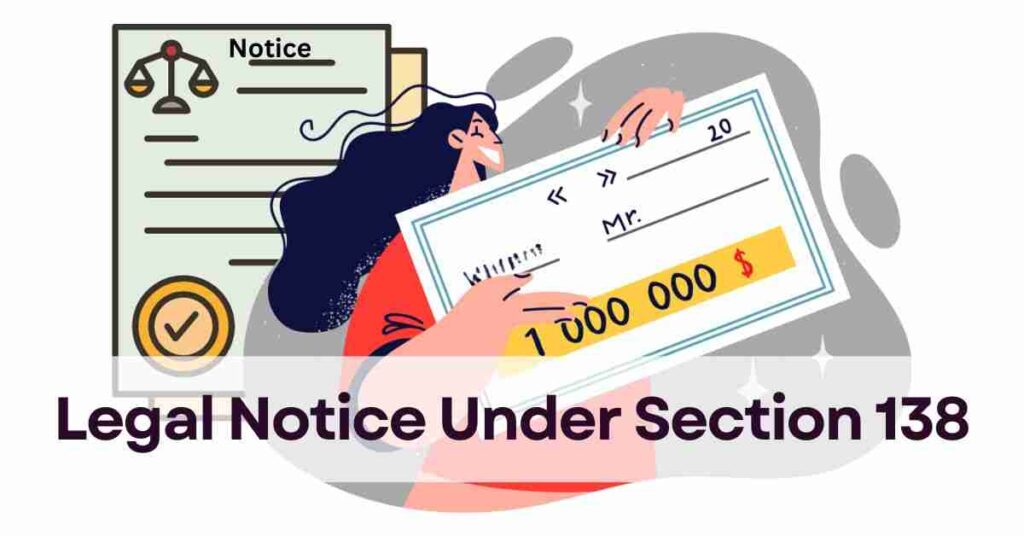
How to Send Legal Notice for Cheque Bounce in India
Step‑by‑step guide, format, deadlines and best practices under Section 138 of the Negotiable Instruments Act to recover bounced cheque dues.
Table of Contents
Introduction: Why a Cheque Bounce Notice Matters
When a cheque bounces, it isn’t just inconvenient—it’s a legally actionable offence under Indian law. A bounced cheque often means insufficient funds, signature mismatch, or other bank-level rejection. If you’re the payee, sending a well‑crafted cheque bounce legal notice is the first essential step toward recovery under the Negotiable Instruments Act, 1881.
Without issuing this legal demand notice for cheque bounce, you cannot claim protection under Section 138. Courts strictly require that the payee send the notice within 30 days of receiving the bank’s return memo, and demand payment within 15 days of notice receipt. Missing these timelines can result in losing the right to sue.
- Present cheque within validity: Usually within 3 months or as per bank rules
- Obtain dishonour memo: Document reason like “insufficient funds” or “signature mismatch”
- Send legal notice: Within 30 days of dishonour memo
- Demand payment: Clearly ask for payment within 15 days
- Threaten legal action: Notify drawer of consequences under Section 138 NI Act
Legal Framework: Section 138 NI Act & Dishonour Memo
The offence of cheque dishonour in India is governed by Section 138 of the Negotiable Instruments Act, 1881. According to the Act, issuing a cheque that is later dishonoured constitutes a criminal offence if certain legal conditions are met:
- The cheque was issued for discharge of a legally enforceable debt or liability
- The cheque was presented within its validity period (generally 3 months)
- The cheque was returned unpaid due to insufficient funds or closed account
- The payee issued a notice in writing within 30 days of receiving the dishonour memo
- The drawer did not pay the cheque amount within 15 days of notice receipt
- The payee filed a complaint within 30 days after the expiry of that 15‑day window
Failure to comply with any of these statutory timelines—presentation, notice, demand period or filing deadline—can invalidate the claim. :contentReference[oaicite:1]{index=1}
Step‑by‑Step: How to Send a Cheque Bounce Legal Notice
Here’s a practical roadmap to send an effective cheque bounce legal notice India:
Step 1: Collect Required Documents
- The dishonour memo or bank return memo as evidence
- Original cheque copy
- Contract, invoice or agreement proving the debt
- Payee and drawer full names and addresses
- Previous correspondence or reminders (if any)
Step 2: Draft the Notice
While a lawyer’s help is optional, it is highly recommended—especially for clarity and compliance with legal requirements. The notice should:
- Be on letterhead (advocate or payee)
- Refer explicitly to “Section 138 of the Negotiable Instruments Act, 1881”
- Detail cheque number, date, amount, bank, branch and date of dishonour
- State the reason as per the bank memo
- Demand full payment of the cheque amount within 15 days of receipt
- Warn of criminal proceedings under Section 138 and legal costs
If you draft it yourself, ensure it meets all elements—many courts reject notice‑copy filings if any ingredient is missing. :contentReference[oaicite:2]{index=2}
Step 3: Send the Notice
- Use Registered Post with Acknowledgement Due (RPAD)
- Prefer Speed Post or tracked courier as well
- Keep delivery receipt / tracking proof
- Optionally send soft copy via email or WhatsApp (to supplement)
The key is to be able to prove delivery or attempted delivery, in order to satisfy court requirements. :contentReference[oaicite:3]{index=3}
Step 4: Track the Response Period
- The drawer has 15 days from date of receipt to pay the full cheque amount
- If payment is made, the matter ends—avoid further court action
- If unpaid, the payee can proceed to file a court complaint within 30 days from expiry of that 15‑day window
Format & Key Elements of the Notice
There is no fixed government-prescribed legal notice format for cheque bounce in India, but it must include all essential components to be valid under law. Here’s a breakdown:
- Name & Address: Full legal name and address of the drawer (accused)
- Cheque Details: Cheque number, date, bank name, amount
- Dishonour Reason: Stated reason from bank’s return memo
- Debt Reference: Mention invoice, loan, or liability for which cheque was issued
- Demand Clause: Specific demand to pay cheque amount within 15 days
- Legal Warning: State intention to initiate criminal proceedings under Section 138 if amount is not paid
Example Opening Line:
“Under instructions from my client, I hereby serve you this legal notice under Section 138 of the Negotiable Instruments Act, 1881, regarding dishonour of your cheque no. XXXXX dated XX/XX/XXXX drawn on [Bank Name] for ₹[Amount]…”
While you may find templates online, every case is different. Use a professional advocate to avoid errors or omissions.
Deadlines & Jurisdiction Rules
Strict timelines govern cheque bounce cases. Missing even a single day can jeopardize your legal remedy. Here’s the checklist of important deadlines:
- Cheque Validity: Usually 3 months from date of issue (subject to RBI updates)
- Presentation Deadline: Within 3 months of cheque date
- Legal Notice: Within 30 days from receipt of dishonour memo from the bank
- Drawer’s Payment Period: 15 days from receipt of notice
- Complaint Filing Deadline: Within 30 days from expiry of 15-day notice window
Jurisdiction: The complaint must be filed at the place where the cheque was deposited, i.e., where the payee’s bank is located. This rule is affirmed in the Dashrath Rupsingh Rathod v. State of Maharashtra (2014) Supreme Court judgment.
Common Mistakes & Pro Tips
Even small errors in sending a legal notice for cheque bounce can cost you your entire case. Here’s what to avoid—and do right:
- Incorrect Dates: Always double-check cheque issue and dishonour dates
- Wrong Address: If sent to the wrong address, drawer may claim non-receipt
- Vague Wording: Clearly state cheque number, amount, and demand for payment
- No Legal Ground: If there’s no written debt or contract, proving liability may be tough
- Delayed Action: Do not wait beyond the legal deadlines—even 1 day delay can cost you
Pro Tip: Always retain a signed copy of the notice, postal receipt, acknowledgement card, and a copy of the tracking ID. These will be required in court to prove that legal notice was properly served.
After the Notice: Filing Complaint or Settlement
If the drawer fails to pay within 15 days of receiving the notice, you have the right to take legal action. Here’s what to do next:
Option 1: File Complaint under Section 138 NI Act
- Approach a Judicial Magistrate (First Class) or Metropolitan Magistrate
- File the complaint within 30 days of notice expiry
- Annex: Copy of cheque, dishonour memo, legal notice, postal proof
- Engage a lawyer to draft complaint and represent your case
- Criminal proceedings begin—accused can face up to 2 years imprisonment or fine, or both
Option 2: Settle Out of Court
- If drawer pays the cheque amount after receiving the notice, the case can be closed
- Always settle via written terms or mutual compromise application in court
- Insist on collecting money via bank transfer or Demand Draft for proof
Note: Even after filing the complaint, parties can opt for compounding (mutual settlement) and file for case closure.
Support from Advocate Ace: Local Experts for Cheque Bounce Cases
Need help sending a legal notice or filing a complaint? Get support from cheque bounce experts near you. Our lawyers handle Section 138 NI Act matters with precision and results. Find help in your city:
- Cheque Bounce Lawyers in Ahmedabad
- Section 138 Experts in Surat
- Legal Notice Help in Vadodara
- Cheque Return Dispute Rajkot
- Cheque Bounce Advocates Bharuch
- Legal Recovery Valsad
- Criminal Complaint Support in Anand
Whether it’s drafting a notice or court filing, our local legal teams are ready to act swiftly and legally recover your cheque amount.
Conclusion: Assert Your Rights with Legal Precision
Cheque bounce is not just a financial insult—it’s a crime under Indian law. By sending a legally valid notice, you take the first step towards asserting your rights under Section 138 NI Act. If the drawer refuses to comply even after notice, you are empowered to initiate criminal proceedings and secure justice.
Always remember: timelines are everything. Use legal support to avoid delays and technical errors. Don’t let the defaulter get away—hold them accountable.
Your money is your right. Protect it with legal power.
Need Help? Talk to a Cheque Bounce Lawyer Now
If you’ve received a bounced cheque, don’t wait. Our legal experts can help you draft the notice, send it properly, and even file a Section 138 complaint if needed. Fast, affordable, and fully compliant with Indian law.
Book a Free Consultation with a LawyerSelect Your Legal Problem
🧑⚖️
Our Verified Legal Experts
Have questions about your case? Talk Directly to Our Lawyers! Our verified advocates are here to guide you with honest, expert legal advice.
🤝 ⚖️






